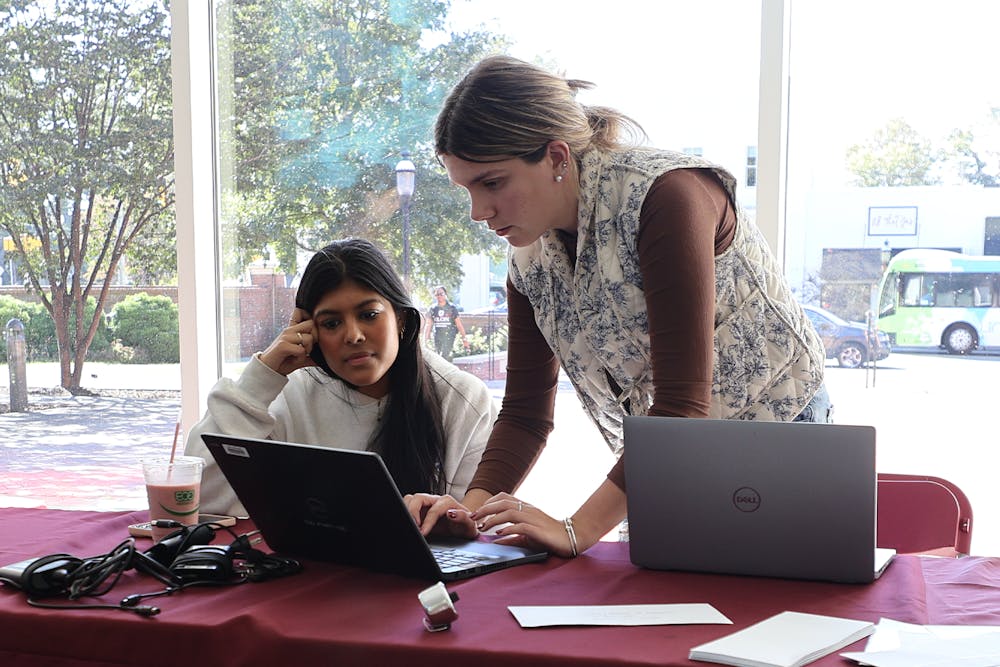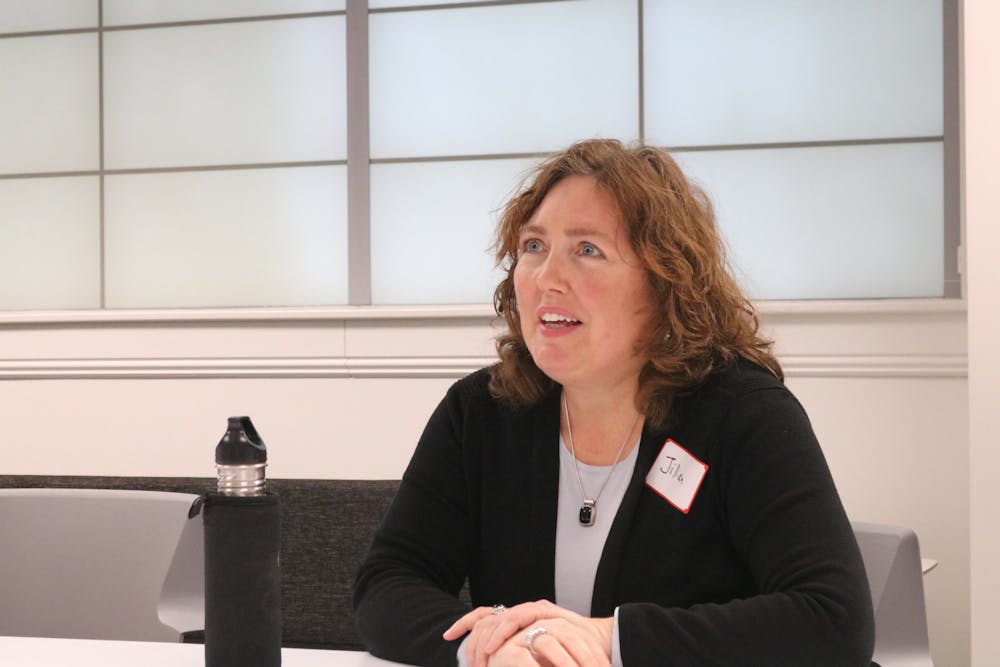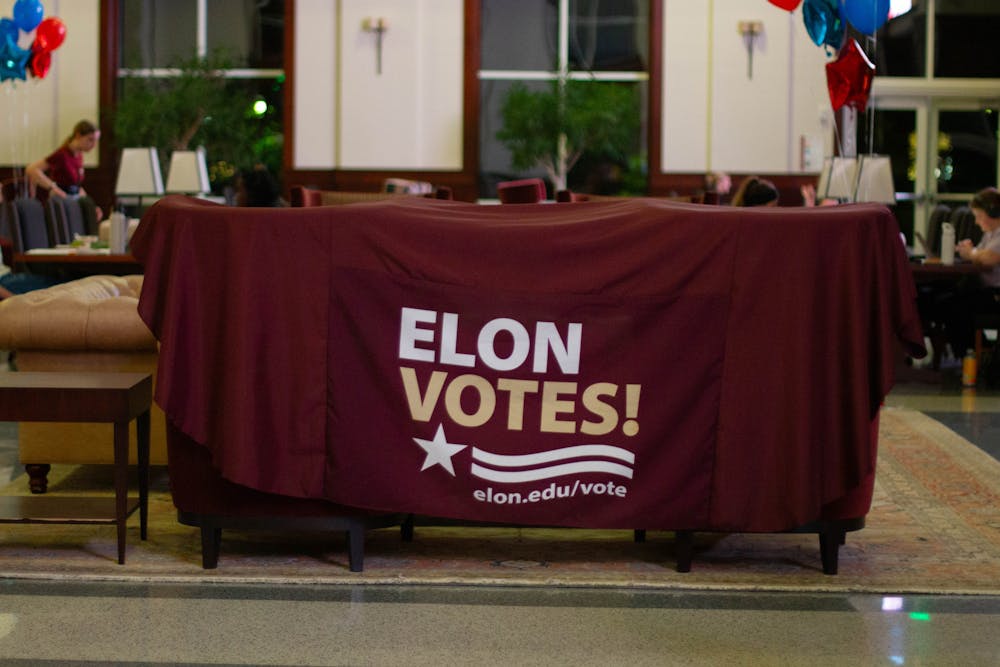Senior Bo Dalrymple said this year he has felt a different, more positive energy on campus regarding politics and civic engagement. He has been involved with civic engagement on campus since he began at Elon University starting with living on the Paideia: Politics and Active Citizenship Living Learning Community his freshman year and is now a co-coordinator for Elon Votes.
“2022 midterm elections was the first major election that I helped, contributed to,” Dalrymple said. “Those were pretty disappointing results, being perfectly honest, the voter registration was pretty good, but the turnout was pretty disappointing.”
The midterm elections voter rate across all institutions was 30.6% and Elon’s was 25% — 3.3% less than in 2018, according to data from the National Study of Learning, Voting and Engagement. Since then, Dalrymple said Elon Votes has been working to increase the voter rate on campus and reach students politically who might be less likely to seek out civic engagement.
Elon Votes’ main goal is to engage students politically, in a nonpartisan way. Elon took action for the first time to prepare for the election, including creating a committee focused on how to handle the election, having close to 20 election-related events in the fall and a appointing team of almost 35 civic engagement ambassadors for Elon Votes — over double what the team generally sees, according to Bob Frigo, director of the Kernodle Center for Civic Life.
But Frigo said Elon Votes and the Kernodle Center are still looking to improve — particularly on engaging students across different areas of campus. He said one of Elon Votes’ and the Kernodle Center’s main goals this election has been to encourage students across campus to participate in civic engagement.

Data collected from the 2022 midterm elections showed that students in the liberal arts and sciences and humanities and business fields of study and the management and marketing fields of studies had the lowest voting rates at Elon of 15% and 16% respectively. The highest rate of civic engagement came from philosophy and religious studies students, who had a 40% voting rate. The Kernodle Center does not receive voting data from NSLVE until almost a year and a half after each election, as its data comes from a national study.
“Once we saw that there was a significant gap in the percentage of students who were registered to vote and the percentage of students who actually cast their ballots, we started to create new energy and infrastructure about absentee ballots, about an early voting site, because there was that gap between registered students and students that were not casting their ballots,” Frigo said.
One strategy Elon Votes employed this year was meeting people where they are. Elon Votes hosted voter registration drives at the Moseley Student Center, the Koury Business Center, the Innovation Quad and in the McEwen School of Communications. Elon Votes also collaborated with different organizations on campus, including Live Oak Communications and Elon’s Student Government Association and visited freshmen-level communication courses to help reach more students.
“Trying to not only be in the physical space, but also target these demographics by connecting with student organizations that might represent them or they might be included in,” Dalrymple said. “Not to say that that was generating huge amounts of turnout, but we considered that if your president or your friend in this organization is there, you might stop by or you might visit, or you might even just stop and say hello and, and that'll generate the conversation.”

Jillian Auditori, a lecturer in policy studies and political science, attends an Elon Votes focus group Feb. 26. She said after leading a Winter Term course focused on primary elections, she is worried about voter turnout.
Another barrier considered — specifically for civic engagement events and discussions — was students not feeling like they know enough to participate politically, professor Julianne Liebenguth, a member of Elon’s Democracy Dialogue Collaborative, said.
The Democracy Dialogue Collaborative is a one-year group, created by the Election 2024 Planning Committee, spearheading discourse focused on civic engagement. Liebenguth is one of three faculty members in this group and is leading the post-election strategy in the spring semester, but the first upcoming event they have is Nov. 14. This event will focus on finding unity across differences with the goal of helping students learn how to facilitate conversations and disagree with one another respectfully, Liebenguth said.
While there have been close to 20 election-focused events this semester, Liebenguth said she wants to get more people involved across campus. She said students, particularly those who aren’t previously involved in politics, might be less likely to vote and attend political events because of perceived barriers of entry.
“I think there's an expectation that people in politics watch the news 24/7 or are completely up to date with all current events and have read all of the headlines that morning, and are therefore well equipped to be involved or to discuss issues, political issues,” Liebenguth said.
Liebenguth said she is encouraged by students in her classes who choose to actively engage in political conversations. She said once students join a conversation and begin speaking on what can be contentious issues within politics, the conversations she has witnessed are respectful and productive — the main issue is still getting people who are not political science students or specifically in a class learning about the election to feel comfortable speaking with others on politics. She said making the post-election events cover a range of topics, including an art project event and other dialogues, can help a diversity of students engage.
“I think our hope is to broaden the scope of politics and broaden the scope of democracy, to suggest to students and people on campus that politics is everywhere,” Liebenguth said. “It's about how we want to live. It's about our communities. It's about who gets us to decide how we live, who makes decisions. It's about accountability, legitimacy, justice. So if you live in a society, then you are well equipped to engage in politics.”


